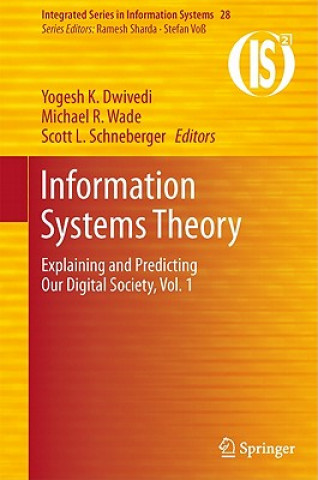
Kod: 01423905
Information Systems Theory
Autor Yogesh K. Dwivedi, Michael R. Wade, Scott L. Schneberger
The overall mission of this book is to provide a comprehensive understanding and coverage of the various theories and models used in IS research. Specifically, it aims to focus on the following key objectives: §To describe the var ... więcej
- Język:
 Angielski
Angielski - Oprawa: Twarda
- Liczba stron: 502
Wydawca: Springer-Verlag New York Inc., 2011
- Więcej informacji o książce

Zobacz książki o podobnej tematyce
-

The Storm
86.90 zł -

Memories of Envy
43.45 zł -

Tenjo Tenge (Full Contact Edition 2-in-1), Vol. 11
50.30 zł -23 % -

Russian Decorative Arts
281.29 zł -14 % -

Desolation and Enlightenment
483.14 zł -5 % -

Coastal Zone Management Imperative for Maritime Developing Nations
1275.12 zł -

Resurrection of Ireland
571.77 zł -

Life Cycles
614.11 zł -

Stone Collector Book 1
74.70 zł -

Advances in Databases
376.07 zł -

Swift's Parody
508.45 zł -

Impact of Federal Investment on Hydrogen and Fuel Cell Technologies
156.47 zł -

Fundamental Approaches to Software Engineering
286.03 zł -

Computational Intelligence in Bioinformatics
864.46 zł
Bon podarunkowy: Radość gwarantowana
- Podaruj bon o dowolnej wartości, a my się zajmiemy resztą.
- Bon podarunkowy dotyczy całej naszej oferty.
- Możesz wydrukować elektroniczny bon z e-maila a następnie przekazać go obdarowanemu.
- Ważność bonu wynosi 12 miesięcy od daty wystawienia.
Więcej informacji o Information Systems Theory
Za ten zakup dostaniesz 742 punkty
 Opis
Opis
The overall mission of this book is to provide a comprehensive understanding and coverage of the various theories and models used in IS research. Specifically, it aims to focus on the following key objectives: §To describe the various theories and models applicable to studying IS/IT management issues. To outline and describe, for each of the various theories and models, independent and dependent constructs, reference discipline/originating area, originating author(s), seminal articles, level of analysis (i.e. firm, individual, industry) and links with other theories. To provide a critical review/meta-analysis of IS/IT management articles that have used a particular theory/model.To discuss how a theory can be used to better understand how information systems can be effectively deployed in today s digital world. This book contributes to our understanding of a number of theories and models. The theoretical contribution of this book is that it analyzes and synthesizes the relevant literature in order to enhance knowledge of IS theories and models from various perspectives. To cater to the information needs of a diverse spectrum of readers, this book is structured into two volumes, with each volume further broken down into two sections. §The first section of Volume 1 presents detailed descriptions of a set of theories centered around the IS lifecycle, including the Success Model, Technology Acceptance Model, User Resistance Theories, and four others. The second section of Volume 1 contains strategic and economic theories, including a Resource-Based View, Theory of Slack Resources, Portfolio Theory, Discrepancy Theory Models, and eleven others. §The first section of Volume 2 concerns socio-psychological theories. These include Personal Construct Theory, Psychological Ownership, Transactive Memory, Language-Action Approach, and nine others. The second section of Volume 2 deals with methodological theories, including Critical Realism, Grounded Theory, Narrative Inquiry, Work System Method, and four others.§Together, these theories provide a rich tapestry of knowledge around the use of theory in IS research. Since most of these theories are from contributing disciplines, they provide a window into the world of external thought leadership.The overall mission of this book is to provide a comprehensive understanding and coverage of the various theories and models used in IS research. Specifically, it aims to focus on the following key objectives: §To describe the various theories and models applicable to studying IS/IT management issues. To outline and describe, for each of the various theories and models, independent and dependent constructs, reference discipline/originating area, originating author(s), seminal articles, level of analysis (i.e. firm, individual, industry) and links with other theories. To provide a critical review/meta-analysis of IS/IT management articles that have used a particular theory/model.To discuss how a theory can be used to better understand how information systems can be effectively deployed in today s digital world. This book contributes to our understanding of a number of theories and models. The theoretical contribution of this book is that it analyzes and synthesizes the relevant literature in order to enhance knowledge of IS theories and models from various perspectives. To cater to the information needs of a diverse spectrum of readers, this book is structured into two volumes, with each volume further broken down into two sections. §The first section of Volume 1 presents detailed descriptions of a set of theories centered around the IS lifecycle, including the Success Model, Technology Acceptance Model, User Resistance Theories, and four others. The second section of Volume 1 contains strategic and economic theories, including a Resource-Based View, Theory of Slack Resources, Portfolio Theory, Discrepancy Theory Models, and eleven others. §The first section of Volume 2 concerns socio-psychological theories. These include Personal Construct Theory, Psychological Ownership, Transactive Memory, Language-Action Approach, and nine others. The second section of Volume 2 deals with methodological theories, including Critical Realism, Grounded Theory, Narrative Inquiry, Work System Method, and four others.§Together, these theories provide a rich tapestry of knowledge around the use of theory in IS research. Since most of these theories are from contributing disciplines, they provide a window into the world of external thought leadership.The overall mission of this book is to provide a comprehensive understanding and coverage of the various theories and models used in IS research. Specifically, it aims to focus on the following key objectives: §To describe the various theories and models applicable to studying IS/IT management issues. To outline and describe, for each of the various theories and models, independent and dependent constructs, reference discipline/originating area, originating author(s), seminal articles, level of analysis (i.e. firm, individual, industry) and links with other theories. To provide a critical review/meta-analysis of IS/IT management articles that have used a particular theory/model.To discuss how a theory can be used to better understand how information systems can be effectively deployed in today s digital world. This book contributes to our understanding of a number of theories and models. The theoretical contribution of this book is that it analyzes and synthesizes the relevant literature in order to enhance knowledge of IS theories and models from various perspectives. To cater to the information needs of a diverse spectrum of readers, this book is structured into two volumes, with each volume further broken down into two sections. §The first section of Volume 1 presents detailed descriptions of a set of theories centered around the IS lifecycle, including the Success Model, Technology Acceptance Model, User Resistance Theories, and four others. The second section of Volume 1 contains strategic and economic theories, including a Resource-Based View, Theory of Slack Resources, Portfolio Theory, Discrepancy Theory Models, and eleven others. §The first section of Volume 2 concerns socio-psychological theories. These include Personal Construct Theory, Psychological Ownership, Transactive Memory, Language-Action Approach, and nine others. The second section of Volume 2 deals with methodological theories, including Critical Realism, Grounded Theory, Narrative Inquiry, Work System Method, and four others.§Together, these theories provide a rich tapestry of knowledge around the use of theory in IS research. Since most of these theories are from contributing disciplines, they provide a window into the world of external thought leadership.
 Szczegóły książki
Szczegóły książki
Kategoria Książki po angielsku Economics, finance, business & management Business & management Business mathematics & systems
1275.12 zł
- Pełny tytuł: Information Systems Theory
- Podtytuł: Explaining and Predicting Our Digital Society, Vol. 1
- Autor: Yogesh K. Dwivedi, Michael R. Wade, Scott L. Schneberger
- Język:
 Angielski
Angielski - Oprawa: Twarda
- Liczba stron: 502
- EAN: 9781441961075
- ISBN: 1441961070
- ID: 01423905
- Wydawca: Springer-Verlag New York Inc.
- Waga: 898 g
- Wymiary: 240 × 160 × 36 mm
- Data wydania: 20. September 2011
Ulubione w innej kategorii
-

The Phoenix Project
84.88 zł -22 % -

Art of the Steal
79.74 zł -23 % -

Technical Analysis Explained, Fifth Edition: The Successful Investor's Guide to Spotting Investment Trends and Turning Points
402.79 zł -

Business Intelligence: A Managerial Approach, Global Edition
379.19 zł -

Beginning Apache Spark Using Azure Databricks
178.85 zł -5 % -

Truth Machine
74.90 zł -23 % -

Enterprise Architecture at Work
534.16 zł -

Management by Business Process
586.79 zł -

Beginning DAX with Power BI
261.13 zł -6 % -

Mastering Microsoft Power BI
297.62 zł -

Fundamentals of Business Process Management
336.95 zł -

Business Math For Dummies
105.86 zł -4 % -

Study Guide for Technical Analysis Explained Fifth Edition
328.88 zł -

Production-Ready Microservices
201.84 zł -

Information Systems Today: Managing the Digital World, Global Edition
333.82 zł -

Business Statistics For Dummies
121.69 zł -

Digital Influence
155.86 zł -7 % -

Deploying SharePoint 2016
467.31 zł -

SAP S/4HANA Conversion
128.54 zł -31 % -

Basic Business Statistics, Global Edition
344.10 zł -

Marketing Data Science
339.87 zł -4 % -

Digitalization in Healthcare
336.74 zł -

Study Guide for Technical Analysis Explained
165.24 zł -3 % -

Getting Started with Grafana
314.46 zł -

Digitalization
336.74 zł -

Azure Automation Using the ARM Model
132.68 zł -5 % -

Getting Started with Data Science
151.73 zł -15 % -

Pro SAP Scripts, Smartforms, and Data Migration
362.15 zł -

Essentials of Licensing Intellectual Property
179.15 zł -

Economist Numbers Guide 6th Edition
70.57 zł -23 % -

Intelligent Methods and Big Data in Industrial Applications
875.25 zł -

Explorations With Texas Instruments TI-85
407.41 zł -

Handbook on Decision Support Systems 2
1130.24 zł -

Social Commerce
481.43 zł -

AI in Marketing, Sales and Service
256.99 zł -

Process Mining Handbook
260.82 zł -

Building Decentralized Trust
722.30 zł -

Building an Enterprise Architecture Practice
692.25 zł -

Unleashing the Power of IT, Second Edition - Bringing People, Business, and Technology Together
198.11 zł -5 % -

Managing IT Projects
245.90 zł -4 % -

Machine Learning in Finance
639.72 zł -

Statistics for Business and Economics, Global Edition
292.99 zł -

Practical Web Scraping for Data Science
325.75 zł -5 % -

Business Process Management
441.70 zł -

Dark Web
869.40 zł -

Cybersecurity
926.27 zł -

Build Your Own Blockchain
376.07 zł -

Process Management
722.30 zł -

Ackoff's Best
256.19 zł -4 %
zadowolonych klientów
Od roku 2008 obsłużyliśmy wielu miłośników książek, ale dla nas każdy był tym wyjątkowym.
Copyright! ©2008-24 libristo.pl Wszelkie prawa zastrzeżonePrywatnieCookies



 21 milionów książek
21 milionów książek Dostawa 10.99 zł
Dostawa 10.99 zł (32) 444 93 66 (8-15.30h)
(32) 444 93 66 (8-15.30h)